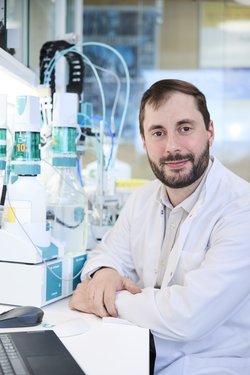Peter Matzen Berg

Can a simple urine test show cystic fibrosis?
Renal physiology
Dr Peder Matzen Berg has studied base secretion by the kidneys, and his research has led to the development of promising new test methods.
As a student of medicine at Aarhus University, Peder Matzen Berg developed an interest in the kidneys, which i.a. control the acid-base balance in the body. Contributing to research at the Department of Biomedicine he got an idea which he later used in a PhD project to develop potentially ground-breaking test methods. First, he tested the idea on mice which had been genetically modified to reflect the condition cystic fibrosis.
“We knew that patients with cystic fibrosis experience excess amounts of base in the body, but we did not know why. So we wanted to study how mutations in patients affected a renal cell function that seemed to play a vital role in the kidneys’ ability to secrete base,” Peder Matzen Berg explains.
His idea was to administer base to mice models in the form of a baking powder solution and via urine samples measure their ability to secrete base. This method turned out to be effective and transferrable to humans, and these results led to a project headed by Peder Matzen Berg and a group of chief physicians from the hospital in Skejby, testing 50 patients with cystic fibrosis.
“We found a clear connection between the kidneys’ ability to secrete base and the severity of the patient’s lung and pancreatic function impairment. In other words, the urine test can reveal the severity of the disease and how well the patient will respond to treatment,” Peder Matzen Berg explains.
Aarhus University has now patented the test, which along with test equipment was developed with support from Innovation Fund Denmark. Peter Matzen Berg now hopes the test will be implemented in hospitals and help doctors find the right medicine and dosage.
“We have also developed a test for patients suffering from kidney failure. By testing patients at an early stage of the disease, we can get a sense of whether or not they are at high risk of needing dialysis or a new kidney, and thus being able to identify patients who will need extensive treatment is useful,” says Peder Matzen Berg, who as a postdoc continues to focus on the kidneys.